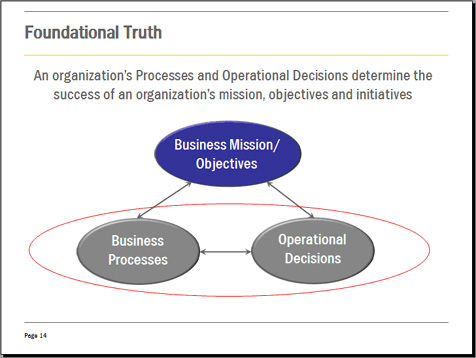Introduction
We are barraged by the images of our sliding economy on a daily basis. The news media is spreading fear, agony, and despair. Many companies are reacting by deeply cutting staff, reducing services, decreasing quality and squelching morale. Everyone is told that they are simply going to have to do more with less (work harder or lose your job).
Then there are companies that see this downturn as an opportunity to strengthen their company and emerge from the other side stronger than their competition.
I may be revealing my age but I have seen several recessions. The smartest response that I’ve ever seen during tough times was that of a CEO of a 26+ billion dollar company. During the last down turn (the dot com crash), he directed his company to focus their efforts on gaining market share, improving quality, and “lean-ing” its operations (reducing costs & improving efficiency). While layoffs were impossible to avoid, he committed himself to finding ways to increase efficiency, improve the quality of products/services, avoid/minimize lay-offs, and build staff loyalty. His vision was to be more competitive, agile, and lean so the company could rapidly grow and gain even more market share. This strategy worked very well. When the economy turned, the company doubled its revenue.
There are no easy answers during tough times and I’m not offering a magic bullet. However, I want to present a vision and ideas on how to gain market share and improve operations that can make a real difference in your company.
Foundational Truth: Business 101
What I’m about to share with you I learned when I was directing a global strategic project across 130+ countries. While this was a successful project, the team encountered problems that are common to most every project. I became fed up with the headaches and decided to find answers. The answers that I found are rooted in the following basic truth…
 Figure 1
Figure 1
A company’s processes and operating decisions are what fulfill its mission, objectives and, most importantly, deliver a product that delights their customers. Keep this in mind and answer the following questions for your company:
1. Does your company have a common language to document Business Processes and Operational Decisions across your enterprise? In other words, if you send two analysts into a business meeting to document processes and operations decisions, do you get two different answers?2. Does your company have the ability to analyze, model and test the impact of Business Process and Operating Decision changes across your enterprise?3. Does your company treat your Business Processes and Operating Decisions as important intellectual managed assets?
Because business processes and operating decisions are the core of every organization, we need a technology independent modeling language that everyone (i.e. business and IT) can easily understand. The solution I use is Business Process Modeling Notation (BPMN) to model processes and the Decision Model (DM) to model Business Decisions (and their underlying rules). These are the basic tools of the two essential disciplines of Business Process Management (BPM) and Business Decision Management (BDM), the two keys that creating a lean, competitive and agile organization.
What Is BPM, BPMN, BDM, DM and Business Architecture?
The management of business processes is BPM and the management of business decisions is BDM. They are two of the foundational pillars that make up business architecture. Think of business architecture as the modeling of your business processes and operating decisions, just as conventional architecture permits the careful design of structures. It provides the means to improve/lean your processes and operating decisions. It works equally well in automated and manual processes and decisions. It works in all types of industries (i.e. manufacturing, service, etc.), government, and education organizations.
BPMN is a technology independent industry accepted standard method for documenting processes. BPMN documents the procedural portions of a process (i.e. work flow). This allows users to manage their processes in BPM, and IT to implement those same processes into technology.
DM is a technology independent industry accepted standard for documenting business decisions and business rules. It documents business logic into organized, manageable, and natural, logical structures (business rules). DM documents the declarative part of a process (i.e. operating decisions and business rules). Separating the process from the decisions is key to creating agile systems and lowering the cost to building and maintaining systems. This allows business to manage their operational decisions in BDM, and IT to implement those decisions into software services that support the implemented business processes.
Even if you cannot perform a full implementation, a partial implementation can provide significant improvements. I implemented a small portion of these methodologies in an IT project and my lead developer estimated that it saved him and quality assurance (QA) 15% to 25% of their time, and significantly improved quality. These savings were realized even though development and QA did not change any of their processes.
How Does BPM and BDM Fit With Other Popular Methodologies?
How do other methodologies such as Lean, Six Sigma and Agile fit into this picture? BPM and BDM are foundational technology independent methodologies that everything can be built on in your organization. Methodologies such as Lean and Six Sigma complement BPM and BDM. Because BPM and BDM are naturally Lean methodologies they are important to implementing Lean in your organization. BPM and BDM will also fit easily into almost every software lifecycle methodology.
How Can This Help With Transforming Legacy Systems?
BPM and BDM can also be helpful in such technical projects as system transformation or modernization of legacy system. This is the process of re-inventing a business system. Sometimes the need for system transformation arises from a business re-engineering or a process improvement effort that recommends a significant change in system capabilities. Sometimes it is merely the movement of an existing system from an obsolete technology platform to a more modern one. Whatever the reason, the first part of the process involves discovering, harvesting, the business logic.
Harvesting business logic from legacy systems using automated software often results in a costly project that harvests a large volume of business rules with no/little context and questionable value. BPM and BDM provide the means to achieve a high value architectural result from System Transformation, at a cost that is potentially no greater (often at a lower cost) than that which would have been paid for a lower value deliverable.
What Are the Benefits (where is the beef!)?
I have seen, from reliable case studies and personal experience, that by implementing BPM and BDM, the cost of projects and operations can be reduced by up to 50% while improving quality. This is especially true for IT projects that enable processes and operating decisions (the reality is, the core purpose of IT is to support the business by providing process and operating decision enablement). This sounds too good to be true but through experience and by personally confirming many case studies, I have seen the proof. Imagine the efficiency improvements this can provide your company during this downturn.
While results will vary depending on the maturity of your organization, you will get significant results that will improve your ability to not only survive this downturn but improve your outlook. Don’t fall into the mentality that you cannot improve your company in hard times. Now is the time to invest modestly to make your company more competitive and agile. The investment pays rapid dividends, and the skills are easily brought in house.
Call to Action
Don’t wait, get started now! The best approach to begin to realize the benefits is to start small. Start with a project where the benefits can easily be realized. This approach will also allow you to manage the costs and measure the benefits. Once you experience success, take the next step by implementing BPM & BDM in another high impact area. Keep doing this until your enterprise is transformed.

















